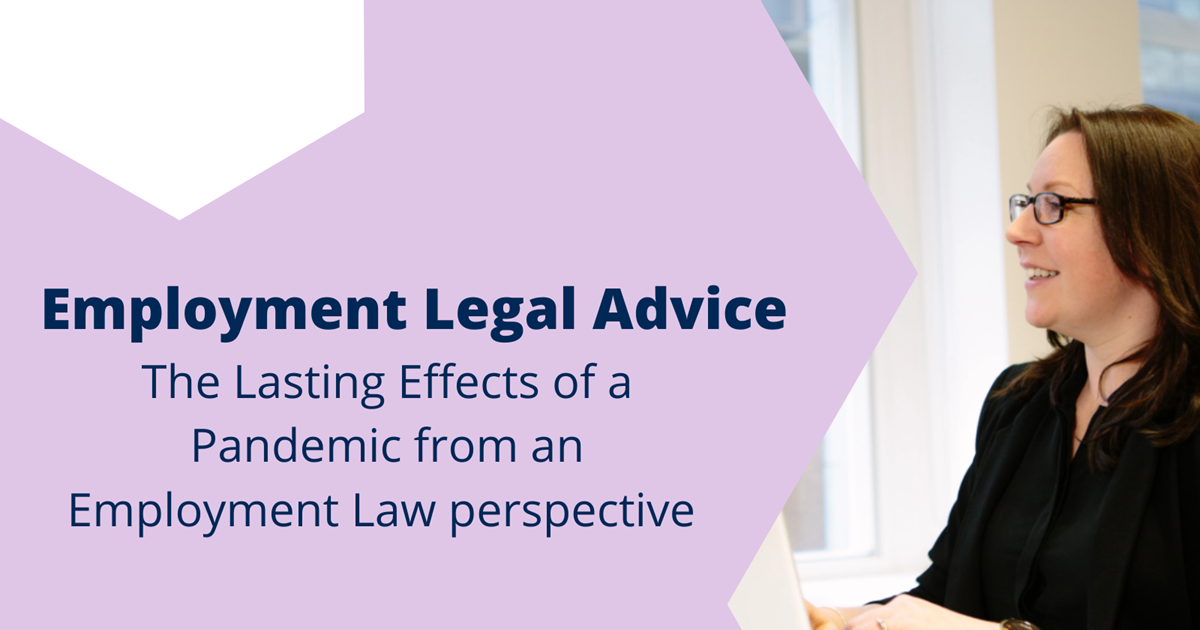The Growth Company together with Citizens Advice Manchester, Citizens Advice Bury & Bolton and a network of legal partners, have set up Employment Legal Advice - a new service to help individuals across Greater Manchester to access free employment-related legal support. Our service is designed to help you access the right advice at the right time as quickly and easily as possible.
The Lasting Effects of a Pandemic from an Employment Law perspective

The Covid-19 pandemic has had a seismic impact on nearly all aspects of life. In particular, it has taken a massive toll on employment and the workplace as we once knew it.
The disruption has meant many businesses have been unable to operate in their usual way, if at all. The catastrophic effect of this can be measured by an increase in both unemployment and redundancies, with the latter at its highest level since records began in 1995.
MSB Solicitors have been looking into the effects of the pandemic on employment, and have shared their findings with Employment Legal Advice below.
Covid-19 and Unemployment Inequalities
Workers from certain demographics have been disproportionately impacted by the coronavirus outbreak. Ethnic minority groups, women, the young, low paid and disabled workers have been most negatively economically affected.
For example, 15% of workers in sectors that have had to shut down due to Covid-19 restrictions (such as hospitality) are from a minority ethnic background compared to 12% of all workers. 57% of hospitality workers are women, compared to a workforce average of 48%, and nearly 50% are under 35 years old.
Low paid workers are also more likely to work in shut down sectors and less likely to be able to work from home. Statistics have also revealed that minority ethnic millennials are 47% more likely to be on a zero hour contract than their white counterparts.
These existing economic disparities could lead to long lasting and devastating effects.
It is also evident that women are more vulnerable to Covid-19 related economic effects because of existing gender inequalities.
Women’s jobs are 1.8 times more vulnerable to the crisis than men’s jobs. Women make up 39% of global employment but account for 54% of overall job losses during the pandemic. One reason for this greater effect on women is that lockdown restrictions significantly increase the burden of unpaid care, which is disproportionately carried out by women.
Organisations play a crucial role in being aware of these disparities and the negative impacts that may result. The McGregor-Smith Review into Race in the workplace found that tackling the racial disparities in the UK labour market could result in an annual economic boost worth £24bn to the UK Economy.
Likewise, policymakers have a duty to not only help the most disadvantaged demographics to access employment, but also to promote job quality, retention, and progression within employment practice. If employers and policymakers act now against gender inequality in the workplace, the McKinsey Global Institute estimate by 2030 it could lead to the creation of 230 million new jobs for women globally.
The Future - Post Furlough
The Government’s Job Retention scheme has provided a lifeline for employers and employees. Between August and November 2020, around nine million people were ’furloughed’ and being paid 80% of their income through the scheme.
This support has been extended to the end of September 2021. After that, employers will need to decide if they can retain their entire workforce or not.
It is unlikely the economy and businesses will have sufficiently recovered enough for all furloughed workers to return to a job. Additionally, throughout the pandemic consumers spending habits have changed (potentially for the long term) with more customers than ever becoming comfortable and competent with online ordering. Businesses are also unable to work at an efficient capacity if social distancing guidelines remain in place.
Further redundancies are expected to be made when the Job Retention Scheme comes to an end. Two-in-five organisations with staff on furlough say they will have to make some or all of their furloughed staff redundant when the scheme comes to an end. The true effects of Covid on employment remain to be seen.
What can I do if I have an employment issue?
If you’re worried about your employment and think you need employment legal advice our service can help you access the right advice at the right time as quickly and easily as possible through the following simple steps:
- Provide us with details of your issue through our online enquiry form, by email or by phone.
- Your enquiry will be passed onto one of our dedicated triage advisors who will review your case and decide on an appropriate pathway for you.
- If one of our advisors thinks you need a further conversation with a solicitor, they will match you with an expert from our network of legal partners offering free advice.
For more information on how the Employment Legal Advice service works and to get in touch, click here.
For a full list of the law firms partnering with Employment Legal Advice, click here.
For more information on MSB Solicitors, click here.


Article by:
Amy Forshaw
Trainee Solicitor
Employment Law & HR
MSB Solicitors
amyforshaw@msbsolicitors.co.uk